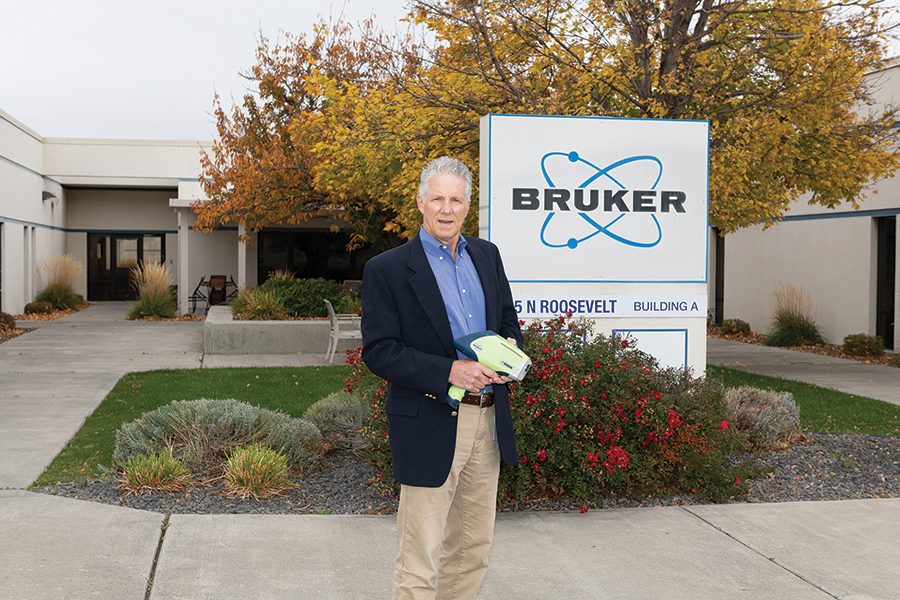
Home » Work wanted: Tech manager seeks jobs for staff as company reorganizes
Work wanted: Tech manager seeks jobs for staff as company reorganizes

November 15, 2021
A profitable Kennewick technology business is being closed by its parent as part of a global reorganization blamed on the pandemic.
Bruker Inc. is merging Bruker’s Nano Handheld-Mobile Portable XRF unit, which employs about 50, with a sister company in Berlin and closing the office at the end of December. It is shifting its work to Europe, Malaysia and the Midwest.
John Landefeld, executive vice president and managing director for Bruker’s Nano HMP business, is taking the unusual step of sharing the company’s story before it disappears.
He wants Tri-Citians to know Bruker’s Kennewick business was and is a success and that it is being merged, not closed. He wants area employers to know it has 33 physicists, engineers, technicians, software developers, marketers and other employees whose jobs are affected by the move.
He has made it his goal to ensure they have new ones by January.
Bruker hasn’t formally announced the move. A June presentation to investors indicated it is cheaper to operate in Malaysia.
Officially, Boston-based Bruker is sending production to Penang Malaysia, engineering to Germany, R&D to Italy and customer service to Wisconsin.
Landefeld intends to retire but most of the Kennewick employees want to stay in the Tri-Cities.
“I’ve just made it a personal mission for me and my team to help my staff,” he said.
Landefeld and the Kennewick team will work through December to meet production goals for the Bruker’s handheld scientific devices, which provide instant analysis of the elemental content of whatever they’re pointed at – machine parts, scrap metal, marine oil, consumer products, soils, archaeological material and even fine art.
Its fine arts business is a key line for Bruker and one that happened by accident.
Art curators seated next to Bruker representatives at a conference were intrigued by the technology they described and recognized it could be helpful in analyzing artwork in conservation labs.
Landefeld said he could not share stories from its museum clients, but said its devices have helped unmask forgeries, identify unearthed finds and guided conservation efforts.
Its scanners show up frequently on The History Channel, he said.
“There’s been amazing stories of stuff that was found to be counterfeit or just the opposite,” he said.
Since Bruker shared plans to close the Kennewick shop, Landefeld said he’s divided his time between managing production and meeting with local business leaders to ensure the talented team have opportunities after their jobs end.
WorkSource is involved and the shop applied for federal retraining funds for workers displaced by layoffs. He is encouraged by the response but still promoting the message to the community.
He said about 10 employees have jobs lined up and a few more plan to leave the area or go back to college.
A storybook ending
Bruker’s departure from Kennewick is not entirely unexpected, but is still a sad ending for a storied success.
It launched as KeyMaster Technologies in 2000 with technology that traces its roots to the Pacific Northwest National Laboratory and private equity funding the founders secured through a contact at General Electric.
Landefeld said the investors didn’t care where the business was located. KeyMaster and its competitors were pioneering a new approach to material testing that didn’t involve massive lab-based equipment. Better still, its mini X-ray tubes did away with radiation.
The investors were intrigued and bought into KeyMaster expecting to sell it within a few years.
Landefeld said Kennewick was a good place to launch. It was able to recruit scientists, including physicists, engineers and software developers, and the other employees it needed.
With price tags of $20,000 to $30,000, its scanners aren’t for consumer use. But they’re a bargain compared to the time and cost of sending materials to labs for testing and the results are comparable.
Bruker bought KeyMaster in 2006 and eventually rebranded it, but left it in Kennewick as a standalone business.
Landefeld always expected Bruker to relocate the business. He’s grateful it remained in Kennewick for more than 15 years and is philosophical about the plans to close it.
“I always assumed this might happen someday,” he said, adding, “We had a great run.”
“We’re sad to see it go too. I feel like it’s my baby. I spent 20 years building this thing,” he said.
Bruker Inc. reported a strong rebound in demand in 2021 after a soft 2020 in its Nov. 1 quarterly earnings report. The company reported its third quarter revenue grew more than 19% to $609 million and for the first nine months of the year, revenue grew 27.5% to $1.7 billion.
It said strong demand for its scientific instruments contributed to its performance.
To reach Bruker to share potential employment opportunities, email marketing.hmp@bruker.com.
Labor & Employment
KEYWORDS november 2021




